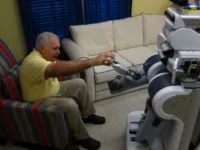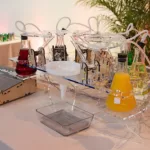
I’m the founder of Science 2.0® and co-author of “Science Left Behind”. A wise man once said Darwin had the greatest idea anyone…Some people are worried that unthinking, uncaring robots will be part of our future. They are concerned about a Cylon uprising or maybe a Terminator, but that is unlikely to happen any time soon; there hasn’t been a true advancement in artificial intelligence since the early 1990s, all we know is that the brain is a lot more complicated than making faster CPUs, regardless of what Ray Kurzweil sells to the public in books (and now from a nice gig at Google also). So robots intelligent enough to really have an impact on our lives are not coming any time soon, but that’s okay, we aren’t ready for it. We’re not even ready to let them answer the door. It seems there is an “uncanny valley” when it comes to more than girl robots and creepy Christmas movies(1). It also applies to caregiving and social situations – about some jobs in that area anyway. Nurses and nurses assistants seem to welcome some robotic assistance – when it comes to mundane tasks like walking patients and doing housework. Presumably that would go for bedpans too, when we are talking about caregiver housekeeping. And I imagine a whole lot of patients probably feel the same way. Georgia Institute of Technology did a survey and found that over half of healthcare providers would rather have a robot than a human; we know why that is. For lower cost jobs in an increasingly expensive country, the quality of human you are going to get is likely going to be low. The days when buildings could afford to hire elevator operators are long gone and that means true quality is rare in lots of lower paying jobs. Robotic helpers will have narrow, well-defined tasks but the quality assurance is built in. Reminders about medications – sure. Suggesting medications – not welcome. And caregivers wanted to keep some things as human contact that might seem surprising; helping people dress, bathing them and feeding them. It might make sense to ask patients on that one too; I’d be much less self-conscious around a robot on all of those things if I were in a situation where I needed a caregiver.








